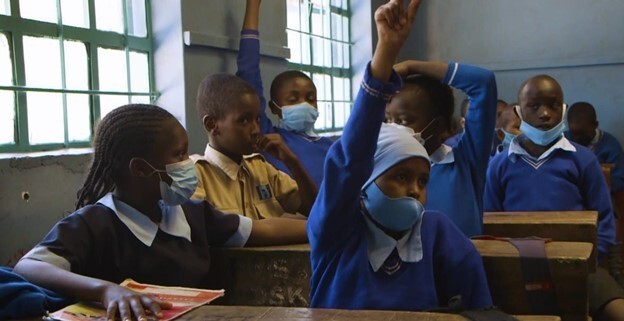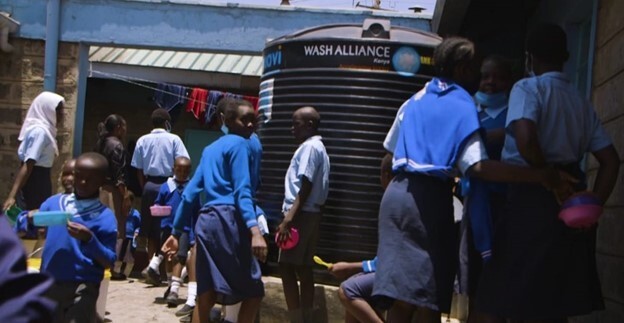Reusable sanitary pads, proper information and water give girls dignity in Kenya
An article by Lillian Mutavi (communication and external engagement) on the WASH First programme for Menstrual Hygiene Day
Menstrual Health Management (MHM) is a topic that is talked about in hushed tones in most households. This throws adolescent girls in a limbo once it comes knocking.
More than access to sanitary pads and toilets
MHM is more than just access to sanitary pads and gender sensitive toilets. Though those are important. It is also about ensuring women and girls can live in an environment that values and supports their ability to manage their menstruation with dignity.

Access to accurate, timely and age-appropriate information about the menstrual cycle is key for girls to achieve menstrual health
This also happened in Korogocho, an informal settlement in Nairobi. Young girls there, from the age of 10-15 years, who are making rapid transitions from childhood to adulthood were caught by surprise by their (first) menstruation.
Taslima Bishar, 11 years old from St Claire Primary school in Korogocho thought she was wounded when she first received her period. She stayed at home for three days, pretended to be sick and didn’t tell anyone what has happened. She - just like her classmates - had never heard of the word menstruation or periods or the little knowledge they had were myths that made them shy away from sharing.
Peris Amboko received her first period at home and told her mother, who gave her a sanitary pad and showed her how to use it. However, she failed to tell Peris that she was to wear it for the next day as well. “The next day I went to school without a pad since I was not aware that it takes more than one day, I soiled my dress and the embarrassment it came with was horrible. I still fear walking in front of boys when I am on my period.”, she said.
The effects of the pandemic on menstrual health and the life of adolescent girls
The Covid - 19 pandemic altered the socio-economic and health dimensions of many societies across the world. For those in urban informal settlements, like Korogocho, the direct and indirect negative impact of the pandemic and the resulting government policies has had devastating consequences on their livelihood.
Lack of planning, investment, and neglect by the government have left informal areas such as Korogocho with inadequate health facilities, lack of proper housing and sanitation, insufficient water and electricity, and an inadequate number of schools, and a depleted economic infrastructure.
More often these areas are substandard and overcrowded, lacking adequate access to public services. In times of crisis, the economic impact is also far more devastating for people there, who often live from hand to mouth. This has seen families budget tightened to providing basic needs such as housing, food and water leaving little or nothing for the menstrual hygiene.
The indefinite closure of schools during the pandemic didn’t improve the situations for adolescent girls. Many dropped out of school or got pregnant because they felt forced to have sex for menstrual pads.
School closing also impacted menstrual health
Sabira Mohamed was afraid to ask for money for pads, since her family struggled to put food on the table. Therefore, she decided to use alternative methods to manage her menstruation during the Covid-19 lock down. Such as tissue paper. She added that water also was limited, as the available water was used for domestic use, she was forced to shower in a public toilet or the river: “I hated that the government closed schools and that the job losses off my parents made life unbearable in the slum.”, she added.
Hafsa Husseins also had no idea about menstruation or periods. She thought she had scratched herself and started bleeding, she told her sister who was in high school who then educated her on menstrual health. The girls say it would have been easier if their menstruation would have happened while schools were in session. Then they wouldn’t have so many insecurities because they would have been avoided as they would have been able to share with peers.
Menstrual Health Management kits keep girls in school
Bishar goes to St Claire Primary school in Korogocho, which is one of the targeted schools where the WASH First programme provided Menstrual Health Management kits (MHM) that included reusable pads and inner pants for the girls to wear during their periods were distributed. These supplies helped girls stay in school and it avoided cases where girls, whose families could not afford to buy them sanitary pads, ended up using unhygienic alternatives or having sex with men in the community in exchange for pads.
WASH First programme
Funded by the Dutch Ministry of Foreign Affairs, the WASH First was set up as the first line of defence against COVID-19. The programme aimed to prevent the further spread of Covid-19 in marginalised countries through awareness raising and improved access to water, sanitation and hygiene (WASH). services. In Kenya the WASH First programme , covered the five largest Nairobi City urban informal settlements among other seven counties in Kenya. The programme ran from October 2020 to November 2021.
One of the key deliverables of the programme was the distribution of key commodities and consumables (e.g., sanitary pads, improving water access via large water storage tanks, hand washing stations and soap) to people to help improve personal hygiene. “Initially we used to have absenteeism, especially when girls had their period, they would miss classes because of fear. Since WASH Alliance Kenya (WAK) gave us these pads, this problem has been reduced.” Faith Masika project manager at WAK said that over 825 girls received the MHM kit. The girls were taught how to use them and how to maintain the reusable pads hygienically.

More than pads: water tanks
WAK also supplied water tanks to the schools. The water tanks relieve pupils of having to pay for the use of water and makes it now possible for girls to manage their menstruation at school: Chuluka Hasaan( 14 year old)“Every pupil used to bring five shilling to school to cater for the water that is used during the day but the 10,000 litre tank is now cushioning parents from the economic pressure,” she added.


